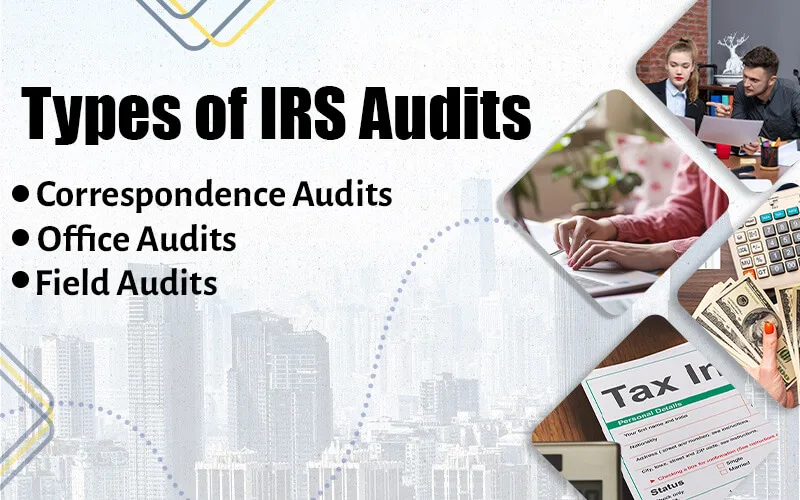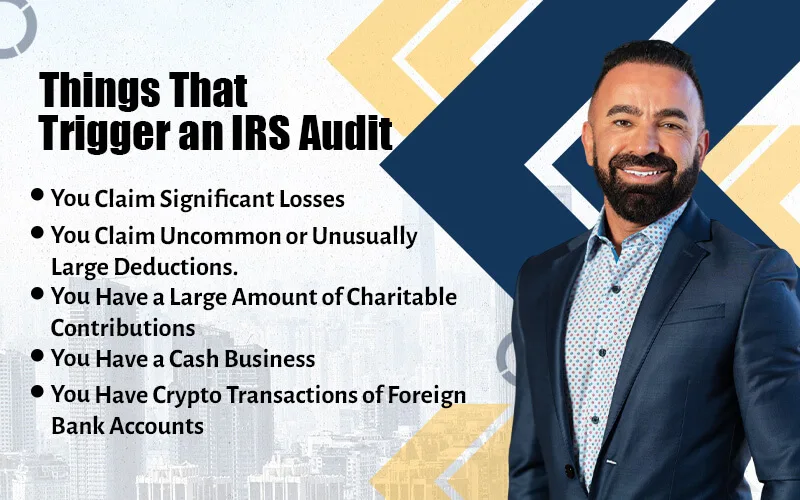Most taxpayers in the USA, whether they are just beginning to pay taxes or have already filed, often ask: What is income tax audit? However, here’s the truth – the risk is being audited is almost always greatly exaggerated by the general public. Of course, it is important to always be accurate and thorough on tax returns, but the actual possibility of being audited is relatively low.
In fact, less than 1% of all taxpayers have to put up with an audit in any given calendar year. Two years ago, only 23% of those audits resulted in a face-to-face encounter with the IRS. Most inquiries are resolved via mail correspondence. The information below will give you the basics of tax audits. It should come in handy if you ever find yourself in this situation.
IRS Audits Explained
What is an IRS audit, anyway? It is a review or an examination of financial information and accounts to ensure the information reported on a tax return is correct according to tax law. During this audit, the IRS will verify whether the amounts reported are correct and ensure that there are no discrepancies that need to be addressed.
The IRS may ask for several types of records during an audit, such as income documents, expense records, proof of deductions and credits, investment and financial records, and other miscellaneous documents to support reported items on your tax return.
Types of IRS Audits

There are three types of audits.
1. Correspondence Audits: These usually require you to provide information or evidence about very specific items made on your tax return.
2. Office Audits: These are a bit more involved, and they require you to go to an IRS office to discuss specific aspects of your tax return.
3. Field Audits: These are typically conducted at your home or business office where you work. Field audits are the most comprehensive and in-depth type of audit to examine complex issues or for situations in which the IRS needs to go through an extensive number of records.
The IRS will tell you which documents you need to present to them beforehand. Whenever someone employs our tax services Playa Del Rey, we always tell them not to offer the IRS agent any info beyond what is needed. Not doing so could generate additional questions.
If your documents support the original return, you should not have a problem, and the result will show “no change.” If the auditor notices a discrepancy, and if you agree to it, you can sign the documents and pay any taxes owed.
It is also possible to appeal the decision of the IRS if you disagree with the auditor’s findings.
Are IRS Audits Common?
Audits have increased slightly in recent years, but the chances of being audited are still low. For all individual returns filed for Tax Years 2013-2021, the IRS examined 0.44% of returns filed as of the end of fiscal year 2023.
According to the 2023 IRS Data Book, most audits are conducted via mail. In 2023, 77.3% of audits were handled via correspondence, whereas 22.7% were conducted in the field. The IRS says that a correspondence audit is cheaper in terms of the direct cost for the IRS and the burden of the taxpayer.
There are also times when the IRS cannot match the info reported to them versus what your included in your tax return. Thankfully, it can be something as simple as providing additional data or an explanation to meet their requirements. Therefore, it is important not to automatically assume that the IRS is correct. Remember to research the discrepancy and be prepared to respond to the IRS with the correct information if necessary.
Things That Trigger an IRS Audit

An IRS audit is triggered when the IRS believes you may have provided incorrect information on your tax return. Below, you will find a list of the most common triggers of IRS audits so that you can take preventive measures to avoid them in the future.
1. You Claim Significant Losses
If you claim an unusually massive business loss or a loss that appears disproportionate to the income being reported, you could potentially get audited. In addition, losses must be supported by legitimate business activities. The IRS will want to make sure you intend to earn a profit and verify your business activity is not a hobby.
2. You Claim Uncommon or Unusually Large Deductions
If your deductions are uncommon or unusually large, your chances of getting audited are typically much higher than average. This is the direct result of taxpayers historically attempting to deduct non-business expenses, such as home telephone service, or including the square footage of living room or bedroom space to artificially inflate their home office deductions.
3. You Have a Large Amount of Charitable Contributions
If you claim a large charitable deduction, including those amounts for non-cash donations, you have a greater chance of being audited. Documentation requirements for charitable contributions are more stringent now than they were before. Proper tax planning Beverly Hills is an effective way of avoiding the gaze of the IRS.
4. You Have a Cash Business
Those who have a cash business usually get more reasons to ask “What is income tax audit” than others because frequent cash transactions can easily conceal income. This goes for taxi driving, hair and nail salons, laundromats, car washes, and delis. The IRS has created a new guide for their agents regarding cash-intensive businesses to address this.
5. You Have Crypto Transactions of Foreign Bank Accounts
Recently, the IRS has been prioritizing taxpayers who engage in crypto transactions to ensure accurate reporting and the prevention of potential underreporting. Moreover, taxpayers who fail to report foreign bank accounts or income from foreign sources can also lead to potential audits.
Note: The IRS will only notify someone of an audit via mail. No one will ever be notified of an audit over the phone.
What To Do If the IRS Audits Your Return?
It is natural for you to feel overwhelmed after receiving an IRS audit notice. Fortunately, you can work with the IRS to prove the information on your tax return was accurate. Here are a few things you need to do if the IRS audits your tax return.
Review Any Info and Requests From the IRS
If you receive an IRS audit notice via mail, the notice may request supporting documentation. In that case, simply provide the supporting documents the IRS asks for within the specified time period, which is typically 30 days. Once you submit your documentation, the IRS will use those documents to confirm your tax return is accurate.
Some of the records that you may need to provide during an IRS audit include receipts, bills, canceled checks, legal papers, loan agreements, logs or diaries, tickets, medical and dental records, theft or loss documents, employment documents, Schedule K-1, etc.
Office and field audits are much more involved. If you are going through an office or field audit, you will have to provide supporting documents and answer in-depth questions about your finances and your business with an IRS agent. It is best to work with a CPA or tax attorney for these types of audits.
Organized Requested Information
Once you know what information the IRS seeks, you can collect and organize any supporting documents. Gather your supporting documents and be prepared to explain any items the IRS has questions about.
For office and field audits, put together as much information as you can and be prepared to answer a long list of questions. The IRS may ask you about bank deposits, sources of income, and other business activities throughout the year.
If you do not have the documents needed during an audit, you may be able to use other records or the statement of a third party to supplement lost records.
Respond
Once you have all the supporting documents at hand and ready to answer questions, you can go ahead and respond to the IRS. If you were audited by mail, you can send those documents to the IRS along with explanations about specific items that triggered the audit.
Based on the information you provide, the IRS may adjust your tax return for misreported income, credits, and deductions you do not qualify for, as well as for mathematical errors.
After you respond, the IRS will decide whether your tax return needs to be adjusted or accepted as is, and will then close the audit.
Can IRS Audits be Appealed?
Yes, it is possible. If you disagree with the results of your IRS audit, you have 30 days to appeal. You can request an appeal with the IRS Office of Appeals.
If you were audited by mail, the letter with the proposed adjustments to your tax return marks the start of the 30-day appeal period. Make sure you appeal within 30 days so you do not lose your right to appeal.
Endnote
Well, there you have it – a definitive answer to the question “What is income tax audit?” As you can see, the subject is not as complex or daunting as people describe it. In any case, if you need help with counting all your moves on your taxes, Jarrar CPA can help.
Jarrar & Associates CPAs will make sure you get every penny you deserve and can guarantee your biggest possible tax refunds.
Must Read: How Much Does a Bookkeeper Cost? An Overview of Bookkeeping Pay Rates in 2025



